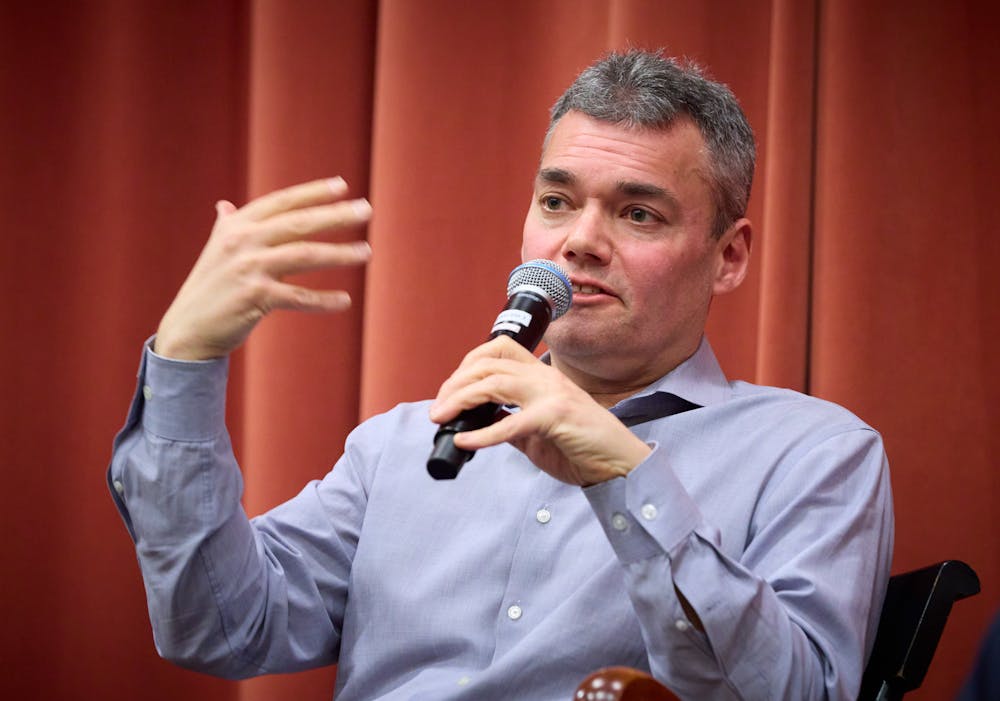Middlebury College hosted a talk with prominent journalist and City University of New York (CUNY) Professor Peter Beinart titled “Being Jewish after the Destruction of Gaza” on Tuesday, March 25. Sponsored by a dozen departments in the college, the event in Wilson Hall was attended by around 130 students and community members, and it was moderated by Professor of History Febe Armanios and Professor of Jewish Studies Ted Sasson.
Beinart is a journalist, MSNBC commentator and author of four books, including the recently released “Being Jewish after the Destruction of Gaza: a Reckoning.” His writing for publications such as the New York Times and the Atlantic has garnered international attention. He’s no stranger to Middlebury, either: Beinart previously spoke on campus in 2012 about his book “The Crisis of Zionism” that reflected on Israel and its role in the peace process with Palestine.
Beinart began the talk by establishing his connection with both Judaism and, more specifically, the state of Israel. Beinart is an Orthodox Jew and as a child, he frequently traveled to Israel; he said being in a majority-Jewish environment gave him a sense of safety and belonging that was rare elsewhere. He then discussed his early experiences interacting with Palestinians in the West Bank and how unmoored he felt after coming to understand the colonial history behind the nation he grew up visiting.
Today, Beinart is an advocate of the one-state solution, a scenario in which Israel-Palestine would be departitioned and Palestinians would live under full legal equality with Israelis. He finds theological justification for this view in the principles of Judaism, as well as a rational argument for such a political system.
“When people are locked out of government, they are more likely to take up arms against the state,” Beinart explained, citing apartheid in South Africa and The Troubles in Northern Ireland as examples of this phenomenon.
Armanios, the history professor who moderated and organized the event, said she appreciated Beinart’s analysis of Israeli policies and the political future of the region.
“On this topic, I find his writing to be lucid and incisive, and the book offers valuable insights into one of the most significant geopolitical and moral issues of our time. The fact that so many groups across campus, from Jewish Studies to Philosophy and the President’s Office, co-sponsored this event shows a widespread hunger for discussions of this topic,” Armanios wrote in an email to The Campus.
Middlebury Rabbi and Associate Chaplain Danielle Stillman also praised the way the moderated discussion was conducted.
“I especially appreciated the format of the Peter Beinart event,” Stillman wrote in an email to The Campus. “Having Professor Sasson and Professor Armanios on stage with Peter Beinart to ask questions provided a range of perspectives on this topic, in conversation with each other, in a public space. I hope we can continue to find opportunities for this kind of exchange.”
Beinart concluded his lecture by saying he shares that same hope for the future of difficult conversations on college campuses such as Middlebury’s.
“I think it is great to try to curate these conversations, and I think that one of the wonderful things about a college campus which brings together people from lots of different backgrounds, is that you have those opportunities, even in informal ways,” he said at the end of his talk. “I often find that the best way to start these things is not to ask about someone’s views, but to ask about their life experiences.”




